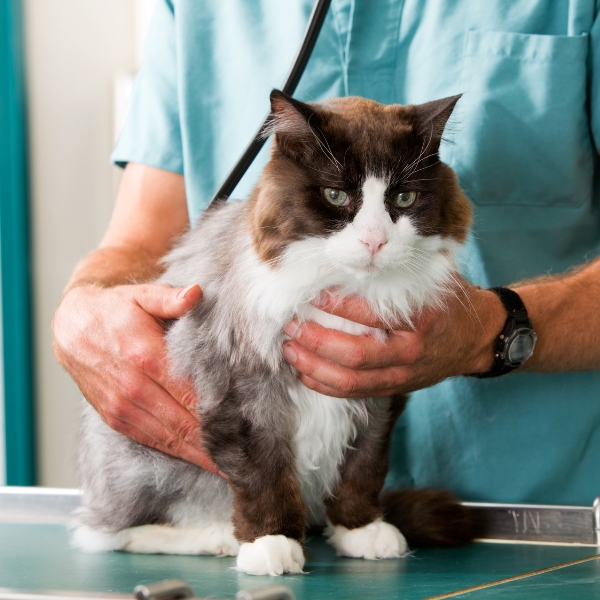At Mount Carmel Animal Hospital, our approach to diagnosing and treating cancer is the same as our approach to all diseases: physical exam, diagnostics ranging from bloodwork to X-rays to CT scans, discussing goals and options, and developing a treatment plan personalized for your pet and your family. We can perform most diagnostics and treat most types of cancers in-house, right here in Monkton, MD. You and your pet have access to the best diagnostics and treatments available in veterinary medicine right here in Northen Baltimore County.
Treatment options for cancer available at Mount Carmel Animal Hospital include surgery, various chemotherapy protocols, and Torigen, new cancer vaccine technology.
How is cancer diagnosed in pets?
The first step in any diagnosis is an office visit. We will discuss any symptoms you have noticed such as weight loss, appetite changes, unusual lumps, persistent sores, or behavioral differences. Our veterinarian will perform a physical exam checking for lumps, swelling, abnormal growths, or signs of pain.
The next step would be diagnostic testing which may include:
- Blood Work: Complete Blood Count (CBC) and biochemistry panels help assess overall health.
- Urinalysis: Can indicate systemic issues related to cancer.
- X-rays (Radiographs): Detect tumors in bones, lungs, or other organs.
- Fine Needle Aspiration (FNA & Cytology): A small needle extracts cells from a lump for examination under a microscope.
- Cytology & Histopathology: Examines cells and tissues to determine if a tumor is benign or malignant.
- Biopsy & Histopathology: A tissue sample is taken surgically for a more definitive diagnosis.
- Ultrasound: Used for abdominal cancers or internal tumors.
- CT scan: Provides detailed imaging for tumors in difficult locations.
All of these diagnostic methods are available in-house at Mount Carmel Animal Hospital in Monkton, MD.
Common Cancers in pets
Dogs and cats can develop various types of cancer. Some are more common than others, depending on species, breed, and age. Some of the most frequently diagnosed cancers in pets:
Common Cancers in Dogs
- Lymphoma – Cancer of the lymphatic system, often causing swollen lymph nodes.
- Mast Cell Tumors – A type of skin cancer that can be aggressive.
- Osteosarcoma – Bone cancer, common in large-breed dogs.
- Hemangiosarcoma – A blood vessel cancer, often affecting the spleen or heart.
- Melanoma – A type of skin cancer, frequently found in the mouth or toes.
- Mammary Gland Tumors – Common in unspayed female dogs.
- Transitional Cell Carcinoma (TCC) – A type of bladder cancer.
- Soft Tissue Sarcomas – Affect muscles, fat, or connective tissues.
- Brain Tumors – Can cause neurological symptoms.
- Lung Cancer – Less common but can be secondary to other cancers.
Common Cancers in Cats
- Lymphoma – Often linked to feline leukemia virus (FeLV).
- Squamous Cell Carcinoma (SCC) – A common oral and skin cancer.
- Mammary Tumors – More frequent in unspayed female cats.
- Fibrosarcoma – Can develop at injection sites (vaccine-associated sarcoma).
- Mast Cell Tumors – Skin or internal tumors.
- Oral Tumors – Often aggressive and difficult to treat.
Risk Factors
- Age: Cancer risk increases with age.
- Genetics: Some breeds are predisposed (e.g., Golden Retrievers for lymphoma, Boxers for mast cell tumors).
- Environment: Exposure to toxins, secondhand smoke, or sun damage can increase cancer risk.
- Viruses: In cats, FeLV and FIV (Feline Immunodeficiency Virus) can contribute to cancer.
Why Choose Mount Carmel Animal Hospital?
Mount Carmel Animal Hospital is dedicated to offering exceptional care for pets in Northern Baltimore County. We are committed to understanding your pet’s unique needs and providing personalized care in a supportive environment.
If your pet has a chronic condition or mobility issues, medical acupuncture might be a great complementary therapy. Contact us to schedule an initial consult.
Cancer Treatment for Pets
Cancer treatment in pets depends on the type, location, stage, and overall health of the animal. The main treatment options include surgery, chemotherapy, radiation therapy, and immunotherapy, often used in combination for the best results.
Deciding on cancer treatment for pets is a difficult decision and personal decision. Factors to consider are your pet’s age, overall health and quality of life. Some treatments may extend your pet’s life significantly, while others focus on comfort. Whatever you decide, we want to support you during this difficult time.
Surgery – available at MCAH
- Best for localized tumors that haven’t spread.
- Removes the tumor and surrounding tissue to prevent recurrence.
- Common for skin tumors, mammary tumors, and some internal cancers.
- May be combined with radiation or chemotherapy for aggressive cancers.
Chemotherapy – Available at MCAH
- Used for cancers that have spread (metastatic) or blood cancers like lymphoma.
- Given as injections or oral medications.
- Pets usually tolerate chemotherapy better than humans, with fewer severe side effects.
- Possible side effects: mild nausea, decreased appetite, or low white blood cell count.
Immunotherapy - Available at MCAH
- Boosts the pet’s immune system to fight cancer.
- Examples include TORIGEN cancer vaccine
- Research is expanding in this area.
Targeted Therapy – Availability at MCAH
- Uses drugs that specifically attack cancer cells without harming normal cells.
- Used for certain cancers like mast cell tumors.
- Fewer side effects than traditional chemotherapy.
Alternative & Supportive Therapies – Available at MCAH
- Dietary changes: Some cancer diets focus on high-protein, low-carb nutrition.
- Supplements: Omega-3s, antioxidants, and medicinal mushrooms may support the immune system.
- Acupuncture & Holistic Medicine: Can help with pain and side effects.
Radiation Therapy – Available through a veterinary oncologist
- Used for tumors that can’t be removed surgically or to shrink tumors before surgery.
- Common for brain tumors, nasal tumors, and bone cancer.
- Administered in multiple sessions under anesthesia.
- Side effects: skin irritation, fatigue, or localized discomfort.

